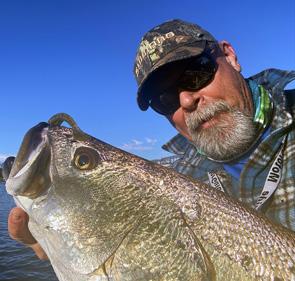
5 minute read
Starlo’s back to basics
The double-edged sword of social media
NSW STH COAST Steve Starling
www.fishotopia.com
Social media has had a massive impact on our fishing world, with both positive and negative consequences for the sport. When historians look back on our current era of ‘digital disruption’ from the distance of a generation or two, I suspect that its defining characteristics may be our dependence on mobile devices and the associated influence of social media in our daily lives. Facebook, Instagram, YouTube, Snapchat, TikTok, Twitter… Look around on a bus, a train or in a restaurant and you’ll typically see at least half of your fellow travellers or patrons hunched over their mobile devices
If you don’t want to give away the precise location of your catch to the whole world, think about what you include in the background of any images posted to social media.

Choosing a nondescript background can help protect vulnerable fish populations and locations.
at any given moment. This proportion increases in younger groups. Some will be texting, checking their emails or reading the latest news, but many will be actively engaged with social media platforms of one type or another.
While social media has been one of the most transformative and influential developments of the 21st century, and has literally helped to shape our world, it has not come without its share of unforeseen consequences: for both individuals and society at large. These consequences have impacted every aspect of modern life, including recreational fishing. I don’t believe that any of us — even the very few who’ve remained staunchly ‘disconnected’ — can honestly claim that social media hasn’t dramatically altered recreational fishing. Some of these changes have been positive… others less so.
For one thing, social media has far too often become a competitive arena intended primarily to promote a culture of envy and jealousy in others, often with damaging impacts on their mental wellbeing. In the words of American author and journalist, Alexandra Samuel: “Envy is so profoundly woven into the experience of using social media that it has brought the term FOMO into common currency: Fear of Missing Out (FOMO) is an almost inevitable by-product of witnessing other people’s vacations, parties, and purchases through social media.” She could well have added prize catches or spectacular fishing experiences to that list of envy-inducing displays. Almost all of us who use social media (myself included) are guilty of indulging in this ‘look at me’ culture from time to time.
However, social media’s negative aspects aren’t confined simply to the generation of jealousy as some sort of perverse sport. The often angry maelstrom of the ‘socials’ has also greatly devalued our learning experiences, cheapened the acquisition of genuine wisdom, fostered dangerous conspiracy theories and allowed those with an axe to grind to throw digital rocks with virtual immunity. Furthermore – and perhaps most critically of all – social media has served to dramatically increase pressure on fragile resources and sensitive places.
This last impact – increased pressure on fish and locations – is one we all need to carefully consider. Back when most of us got our angling intel’ from magazines like this one, there was a lag time between the generation of “news” and its wider dissemination. That lag or lead-time ranged from weeks to months, depending on the publication. Today, thanks to social media, “news lag” has been reduced to minutes or even seconds. It’s possible for others to see – almost in real time – what’s being caught, how it’s being caught and exactly where.
While most of us have benefitted at times from this extraordinary level of connectivity and sharing of intel’, we also need to be aware of some of its potentially darker consequences. Remember that not everyone watching and learning has your noble intentions. The next commercial netter, poacher, over-harvester or blatant rule breaker to use a social media post as a tool to pinpoint a vulnerable concentration of fish certainly won’t be the first.
The message is simple: Think before you post! Yes, there’s a good reason some of today’s more savvy social media ‘fishing influencers’ delay or stagger their posts, frame photos carefully, and even digitally disguise backgrounds in images to obscure locations. They’re protecting their own ‘intellectual property’, for sure, but they’re also guarding fish and fishing spots.
Unfortunately, I believe that the negative aspects inherent in modern social media will only continue to grow in the next few years, further diminishing the true value of these platforms and driving increasing numbers of people to seek out more mature, inclusive and welcoming arenas for engaging with like-minded folk. That’s just how it is, and there’s little point in bemoaning the existing reality. It is what it is. But at least we can all be more aware of the potential pitfalls, and perhaps think twice before hitting that ‘post’ tab.


The ubiquitous ‘selfie’: stock in trade of the modern social media user.





























